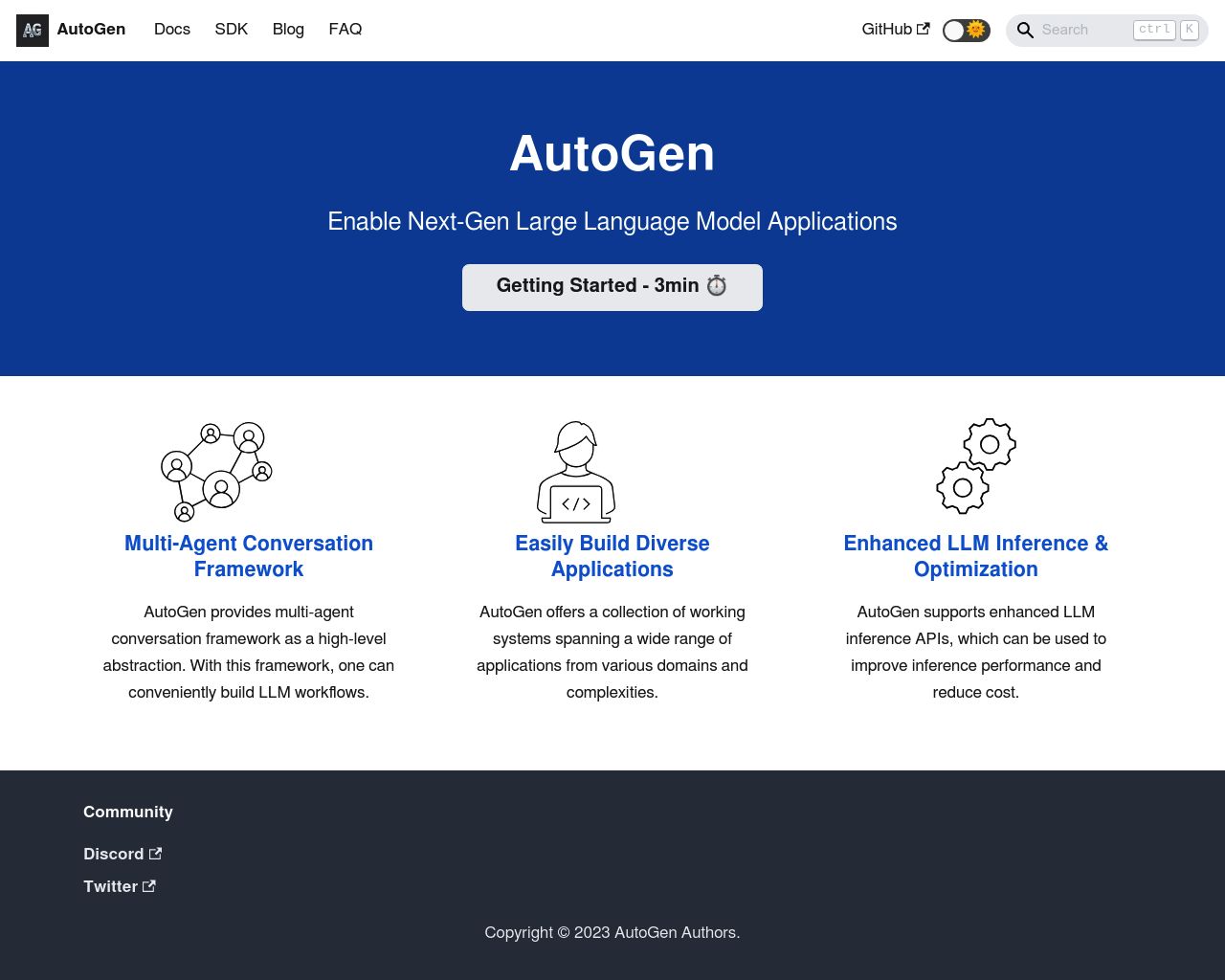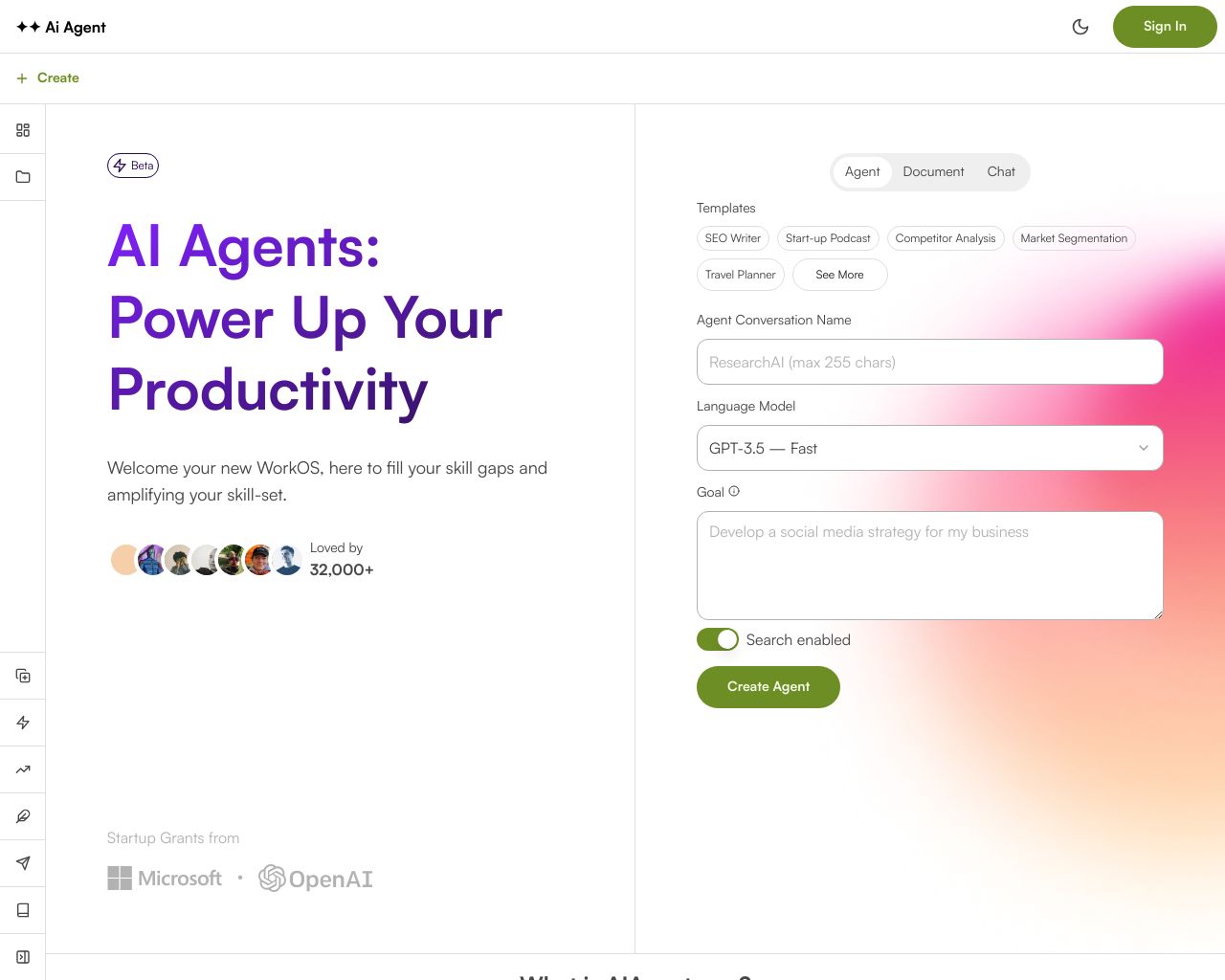AI agents revolutionize how businesses and developers harness machine intelligence. AutoGen vs AI Agent offer distinct approaches to building sophisticated AI systems, each with unique strengths and limitations. AutoGen excels in multi-agent collaboration and LLM optimization, while AI Agent provides an accessible platform for rapid automation. This comparison explores their key features, use cases, and development workflows to help you choose the right tool for your AI projects. We’ll also introduce SmythOS, a comprehensive platform that combines powerful AI capabilities with user-friendly design, addressing gaps in both AutoGen and AI Agent to deliver a superior solution for AI agent development and deployment.
AutoGen Overview
AutoGen empowers developers to create sophisticated AI applications using multi-agent conversations. This open-source framework enables customizable agents to interact with each other, Large Language Models (LLMs), tools, and humans to tackle complex tasks.
At its core, AutoGen excels in facilitating multi-agent collaboration. These agents can operate autonomously or incorporate human feedback, adapting to diverse use cases. The framework optimizes LLM performance through advanced inference capabilities, including tuning, caching, error handling, and templating. This approach maximizes the utility of powerful models like ChatGPT and GPT-4.
AutoGen empowers developers to create sophisticated AI applications using multi-agent conversations. This open-source framework enables customizable agents to interact with each other… to tackle complex tasks.

AutoGen supports both fully autonomous operations and human-in-the-loop problem-solving. This flexibility proves invaluable for applications requiring human input. The framework demonstrates effectiveness across various domains, from automated task solving and code generation to continual learning and complex problem-solving in group chat scenarios.
For developers, AutoGen offers robust debugging tools and logging functionalities for API calls. These features prove essential for diagnosing and optimizing LLM-based systems. The framework also includes EcoOptiGen, a cost-effective technique for tuning large language models, emphasizing efficiency and effectiveness.
While AutoGen provides powerful capabilities, it lacks certain features found in some competitors. The framework doesn’t offer a visual builder or no-code editor, requiring coding knowledge for setup and configuration. Additionally, there’s no mention of specific features like data encryption, IP control, or integration with Hugging Face models. Despite these limitations, AutoGen’s focus on multi-agent collaboration and LLM optimization makes it a compelling choice for developers seeking to build advanced AI applications.
AI Agent Overview
AI Agent empowers developers to create, host, and manage AI agents through its open-source platform. These agents collaborate to tackle complex tasks, revolutionizing problem-solving in various domains. The platform’s core strength lies in facilitating multi-agent interactions, enabling teams of AI to work together seamlessly.
Developers leverage AI Agent to build sophisticated AI systems capable of autonomous operation and human-AI collaboration. The framework supports both development and production environments, allowing for smooth transitions from testing to deployment. AI Agent’s flexibility shines through its support for various AI models, including those from OpenAI and other providers, expanding the possibilities for AI applications.
AI Agent empowers developers to create, host, and manage AI agents through its open-source platform. These agents collaborate to tackle complex tasks, revolutionizing problem-solving in various domains.

AI Agent excels in memory and context management, utilizing persistent threads to maintain conversation history. This feature enhances the agents’ ability to engage in meaningful, context-aware interactions. The platform also prioritizes explainability and transparency, offering tools to review workflows and understand agent decision-making processes.
While AI Agent provides powerful capabilities, it requires coding knowledge for setup and configuration. The absence of a visual builder or no-code editor may limit accessibility for non-technical users. However, for developers and technical teams, AI Agent offers a robust framework for creating sophisticated AI solutions with extensive customization options.
AI Agent excels in memory and context management, utilizing persistent threads to maintain conversation history. This feature enhances the agents’ ability to engage in meaningful, context-aware interactions.
Integration capabilities stand out as a strength of AI Agent. The platform supports various APIs and tools, including those for Robotic Process Automation (RPA). This flexibility allows for seamless incorporation of AI agents into existing workflows and systems, enhancing overall productivity and efficiency in diverse business environments.
Feature Comparison
AutoGen and AI Agent offer powerful capabilities for building AI systems, but significant feature gaps exist between them. AutoGen excels in facilitating multi-agent collaborations and optimizing large language model performance. Its framework enables customizable agents to interact autonomously or with human input. However, AutoGen lacks a visual builder or no-code editor, requiring coding knowledge for setup and configuration.
AI Agent provides a more accessible platform with its intuitive interface for creating and deploying AI agents without extensive technical expertise. It offers pre-built templates and supports integration with over 6,000 apps, enabling rapid automation of diverse tasks. Unlike AutoGen, AI Agent includes a visual workflow builder that simplifies agent creation for non-technical users. This key difference makes AI Agent more suitable for business users and those without coding skills.
In terms of security and core components, both platforms have limitations. Neither explicitly mentions features like data encryption or IP control. AutoGen supports OAuth authentication and integrates with various APIs, while AI Agent’s security features are not clearly outlined. For advanced AI capabilities, AutoGen leverages foundation models from providers like OpenAI, whereas AI Agent’s AI model support is less defined. These gaps highlight areas where SmythOS excels, offering robust security measures, extensive API integrations, and support for multiple AI models to provide a more comprehensive solution for AI agent development and deployment.
Feature Comparison Table
| AutoGen | AI Agent | SmythOS | |
|---|---|---|---|
| CORE FEATURES | |||
| Visual Builder | ❌ | ✅ | ✅ |
| No-Code Options | ❌ | ✅ | ✅ |
| Audit Logs for Analytics | ✅ | ❌ | ✅ |
| Agent Work Scheduler | ❌ | ❌ | ✅ |
| SECURITY | |||
| Constrained Alignment | ❌ | ❌ | ✅ |
| IP Control | ❌ | ❌ | ✅ |
| COMPONENTS | |||
| Foundation AIs | ✅ | ❌ | ✅ |
| Data Lakes | ❌ | ❌ | ✅ |
| DEPLOYMENT OPTIONS (EMBODIMENTS) | |||
| Staging Domains | ❌ | ❌ | ✅ |
| Production Domains | ❌ | ❌ | ✅ |
| Deploy as Scheduled Agent | ❌ | ❌ | ✅ |
| DATA LAKE SUPPORT | |||
| Hosted Vector Database | ❌ | ❌ | ✅ |
| Sitemap Crawler | ❌ | ❌ | ✅ |
| YouTube Transcript Crawler | ❌ | ❌ | ✅ |
Best Alternative to AutoGen and AI Agent
SmythOS emerges as the superior alternative to AutoGen and AI Agent, offering a comprehensive platform for AI agent development and deployment. Our solution combines powerful capabilities with unparalleled ease of use, making advanced AI accessible to users of all skill levels. SmythOS’s visual builder and no-code options enable rapid agent creation without sacrificing functionality, a stark contrast to AutoGen’s code-heavy approach and AI Agent’s limited customization.
We excel in providing a robust feature set that addresses critical gaps in both AutoGen and AI Agent. Unlike our competitors, SmythOS offers advanced security measures, including constrained alignment and IP control, ensuring your AI deployments remain secure and compliant. Our platform supports a wide array of foundation AI models and integrates seamlessly with numerous APIs and data sources, surpassing the limitations of both AutoGen and AI Agent in terms of flexibility and extensibility.
SmythOS offers advanced security measures, including constrained alignment and IP control, ensuring your AI deployments remain secure and compliant.
SmythOS stands out with its superior deployment options. We provide staging and production domains, scheduled agent deployment, and the ability to deploy as APIs, webhooks, or chatbots. These capabilities far exceed what AutoGen and AI Agent offer, allowing for more versatile and scalable AI solutions. Our hosted vector database and support for various data crawling and processing tasks further enhance the platform’s utility across diverse use cases.
Perhaps most importantly, SmythOS delivers on the promise of unlimited use cases. Whether you’re building customer service chatbots, automating complex business processes, or developing cutting-edge AI research tools, our platform adapts to your needs. The combination of our intuitive interface, extensive integrations, and powerful AI capabilities means you can bring your ideas to life faster and more efficiently than ever before. With SmythOS, we’re not just offering a tool — we’re providing a gateway to the future of AI-powered innovation, surpassing the limitations of AutoGen and AI Agent to deliver a truly comprehensive solution for the AI era.
Conclusion
AutoGen, AI Agent, and SmythOS each offer unique approaches to AI agent development and deployment. AutoGen excels in multi-agent collaboration and LLM optimization, making it a powerful tool for developers seeking advanced AI capabilities. AI Agent provides an accessible platform with extensive app integrations and a visual workflow builder, catering to users with varying technical expertise.
SmythOS, however, stands out as the superior choice, combining the strengths of its competitors while addressing their limitations. Our platform offers a comprehensive solution for AI agent development, featuring a user-friendly drag-and-drop interface, extensive API integrations, and support for multiple AI models. We prioritize security, scalability, and ease of use, making advanced AI capabilities accessible to both technical and non-technical users.
Unlike AutoGen and AI Agent, SmythOS provides robust features such as data encryption, IP control, and integration with Hugging Face models. Our platform supports multimodal interactions, problem-solving capabilities, and scalable deployments as APIs, chatbots, and scheduled agents. These features, combined with our intuitive visual builder and no-code editor, empower users to create sophisticated AI solutions without extensive coding knowledge.
To experience the future of AI agent development and deployment, create a free SmythOS account today. Discover how our platform can revolutionize your workflow, automate complex tasks, and drive innovation across your organization. With SmythOS, you’ll have access to cutting-edge AI technology and the tools to build, deploy, and manage AI agents with unprecedented ease and efficiency.